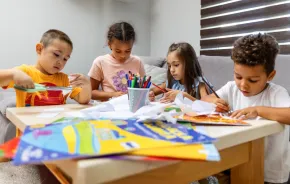
Chances are good you’ll need to have at least one constructive conversation with your child’s teacher this school year. As a teacher, I highly recommend using chocolate (it’s the answer to everything) but keep these suggestions for strong communication handy, too. (Do be sure to give them lots of chocolate, though.)
Be efficient. Everyone’s busy. When they are not basking in the glorious stretch of summer vacation months, teachers are typically slammed with lesson planning and paperwork even once the teaching day is done. Good teachers will value parental insight and academic reinforcement; however, they’ll always prefer a scheduled quick, 10-minute chat to a lingering “hallway conference.” Even better: a short, solution-oriented email.
Write that email. Here’s one example on how to craft an email that will get results:
Dear [teacher’s name],
I hope this finds you well. First, I’d like to share with you how much [child's name] enjoyed [activity, encouragement, etc.]. (S)he and our family truly appreciate your efforts!
I have a question for you regarding [problem/situation]. It occurs to me that [propose solution] would be effective and a positive way to address the issue, but, of course, I’m eager to hear your thoughts as we work on a solution for [child’s name].
Thanks again,
[Your name]
This email works because 1) it’s brief, 2) it uses “we” (make yourself the third leg in the great stool of education!) and 3) it’s positive. Sure, you might think it sickeningly sweet but until your relationship with your student's teacher develops, there’s no harm in being a little overly positive.
And remember: The educational world is quite bureaucratic. Everything comes down to the paper trail. Should — and this should only ever be a last resort — you need to escalate to an administrator, your documentation is your credibility.
Know how much is too much. Work with your child’s school in a professional manner, but be as tenacious as a badger! Never rest until your child’s needs are being met! My mother worked with the school system until her conversations with teachers until together they realized I have dyslexia. Soon enough, I was back on track!
More from "The Teacher's Desk"
3 Tips for Tutoring Your Child at Home
Ideally, after a smooth start, communication will flow effortlessly. Regardless, make sure to get updates on your child’s progress every six weeks. These check-ins will allow you to adjust that much appreciated home reinforcement. You’ve got to know what your child is working on to know how to support at home.
You are your child’s educational coordinator, coach and comfort. You care about their education as no one else will. Once I was a child whose mother paved the pathway to ensure there were no cracks for me to fall through. Now, I am a father straining my eyes as I survey the road before my own child, seeing her grow into a marvel. I know you can make a difference for your child!
Originally published by Bright Pathways











